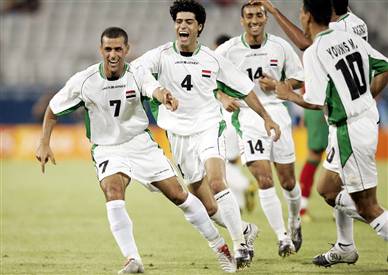
Forget the World Cup head butt, football (soccer for those who think “football” is a foreign word for the world’s most popular sport) may now be one of the only bright spots in war-torn Iraq’s immediate future. In case you have not heard, the Iraqi National Team won the Asia Cup. They did it with Shi’a, Sunni and Kurd and without the threat of torture for a missed goal. Their star, Younis Mahmoud, scored the winning goal against Saudi Arabia. Soon after ordinary Iraqis took the streets with guns, but shot into the air in celebration rather than at each other. At least for one day. Simon Apter has a nice article about this in The Nation.
Iraq’s success in soccer is, perhaps, one of the few concrete triumphs to have come out of the quagmire. Call it a beneficent side effect. The WMDs were, indeed, not there, but the bastinado was, awaiting whomever Uday capriciously felt had embarrassed the country with a sub-par performance. Running possibly the only Ministry of Sport complete with a torture chamber and jail, Uday made Bob Knight look like Francis of Assisi. “We played every match with the fear of punishment, an intense psychological pressure,” Mowafak Nuri, a retired soccer player, told the Christian Science Monitor in 2003, four months after Uday and his brother, Qusay, were killed by the 101st Airborne Division in Mosul. “[Uday] destroyed the performances of the national team.”
The team’s revitalization since then has been extraordinary–and unavoidably draped in politics. Sunday’s win over the Saudis in Jakarta capped a remarkable three-year run for Iraqi soccer. A scrappy under-23 Iraqi side captured fourth place at the ’04 Olympics after losing, 1-0, to Italy in an emotional bronze medal match played just one day after Sunni militants murdered Enzo Baldoni, an Italian journalist working in Najaf. Both teams wore black armbands in honor of the slain freelancer in a natural gesture of mourning and solidarity, but, unfortunately, little overt notice was given to however many Iraqis the 3,200 Italian soldiers in the Coalition of the Willing had killed theretofore in the war; there probably weren’t enough armbands. After President Bush attempted to trade on the team’s success in a re-election advertisement, Iraqi players protested. Though Bush’s invasion had freed Iraqi players from Uday Hussein, something far more complicated than gratitude bubbled to the surface. “My problems are not with the American people,” coach Adnan Hamad told Sports Illustrated while in Athens. “They are with what America has done in Iraq: destroy everything. The American army has killed so many people in Iraq. What is freedom when I go to the [national] stadium and there are shootings on the road?”
This year’s Iraqi team again wore black on the field. In Baghdad following last week’s semifinal win, more than fifty people died from suicide bombings. The violence barely took a break after the championship. President Bush, perhaps having learned a lesson at the Olympics, thus far has remained quiet about the soccer news. Team captain Younis Mahmoud, though, is speaking from the winner’s platform. “I want America to go out,” he said. “Today, tomorrow, or the day after tomorrow, but out. I wish the American people didn’t invade Iraq and, hopefully, it will be over soon.”